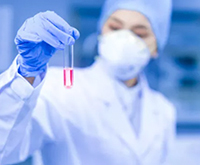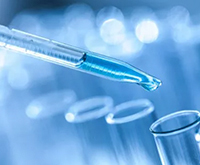Procalcitonin (PCT)
Procalcitonin (PCT), a member of the calcitonin superfamily, could be a critical tool for diagnosing sepsis.
Procalcitonin is a peptide precursor of the hormone calcitonin, the latter involved with calcium homeostasis. It arises once pre procalcitonin is cleaved by endopeptidase.
Current targeting conventional markers (C-reactive protein, white blood cell, tumor necrosis factor-α, interleukins, etc.) are non-specific for diagnosing sepsis. Rapid elevation in the concentration of procalcitonin and other newly emerging biomarkers during disease and its correlation with severity of illness makes it an ideal biomarker for bacterial infection.
But to distinguish between bacterial versus viral infections, procalcitonin alone may not be effective.
Besides, the procalcitonin levels can monitor response to antimicrobial therapy, diagnose secondary inflammations, diagnose renal involvement in pediatric urinary tract infection, etc.

Procalcitonin (PCT) Products
| CAT | Name | Description | Application |
| PCT-402 | PCT Antibody-recommended | Mouse Anti-human PCT mAb | LFA Capture |
| PCT-413 | PCT Antibody-recommended | Mouse Anti-human PCT mAb | LFA Detection |
| S01-PCT-3M | PCT Antibody | Mouse Anti-human PCT mAb | LFA Elisa CLIA Detection |
| S01-PCT-5M | PCT Antibody | Mouse Anti-human PCT mAb | LFA Elisa CLIA Capture |
| SS-PCT-Ag | PCT Antigen | Recombinant PCT antigen |
PCT FIA test and uncut sheet are available!

Procalcitonin Antibody
PCT (procalcitonin) is a protein that increases in plasma levels during severe bacterial, fungal, and parasitic infections and in sepsis and multiple organ failure. PCT is not elevated in autoimmunity, allergy, and viral infections.
Locally limited bacterial infections, mild infections, and chronic inflammation do not cause it to rise. Bacterial endotoxin plays a crucial role in the induction process.
PCT Test
PCT reflects the active degree of systemic inflammatory response. Factors that affect PCT levels include:
The size and type of the infected organ.
The type of bacteria.
The degree of inflammation.
The state of the immune response.
In addition, PCT can only be measured 1 to 4 days after major surgery in a small number of patients.
Elevated PCT levels are seen in severe shock, systemic inflammatory response syndrome (SIRS), and multiple organ dysfunction syndromes (MODS), even in the absence of bacterial infection or bacterial foci. However, PCT levels in these cases were generally lower than those with bacterial foci. Induction may be caused by cytokine release or bacterial translocation from the gut.
- Cardiac Markers
-
Tumor Marker
-
PGII
-
G17
- CA50
-
CA125
- CA242
-
CA15-3
- CA19-9
- CA72-4
-
Pepsinogens I (PGI)
-
Human Epididymis 4 (HE4)
- Prostate-Specific Antigen (PSA)
- Squamous Cell Carcinoma (SCC)
- Neuron-Specific Enolase (NSE)
- Cytokeratin 19 Fragment (CYFRA21-1)
- Human Progastrin-releasing Peptide (ProGRP Tumor Marker)
- Protein Induced by Vitamin K Absence or Antagonist-II (PIVKA II Tumor Marker)
- Alpha-fetoprotein(AFP)
-
CEA
-
Human Chitinase 3-like 1
-
PGII
- Inflammatory Marker
- Infectious Disease
- Hormones
- Thyroid Function
- Glucose Metabolism
- Bone Marker
- Others
-
Heterophilic Blocking Reagent
- Animal Diagnostics

















